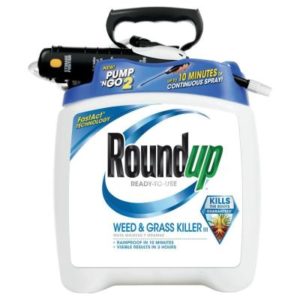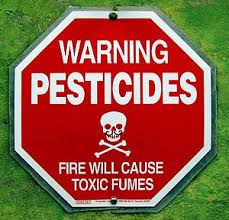 We all get exposed to pesticides to varying degrees - whether from our water, foods we eat, inhaling them, or absorbing them through our skin (e.g., walking or playing on pesticide treated lawns). Unfortunately, studies show our exposure to the pesticide glyphosate (found in Roundup) is increasing each year.
We all get exposed to pesticides to varying degrees - whether from our water, foods we eat, inhaling them, or absorbing them through our skin (e.g., walking or playing on pesticide treated lawns). Unfortunately, studies show our exposure to the pesticide glyphosate (found in Roundup) is increasing each year.
The CDC (Centers for Disease Control and Prevention) does biomonitoring of persons in the US to see what chemicals we are being exposed to by measuring levels in the blood and urine of both adults and children. They recently released the finding that about 80% of us have glyphosate residues. Even worse, about 87 percent of the 650 children they tested had detectable levels of glyphosate in their urine.
 Glyphosate is the most widely used herbicide (it kills vegetation) in the US and the world. Nearly 300 million pounds of the pesticide are applied each year in the United States, with greater than 88.6 pounds per square mile in the US midwest (according to the USGS). Glyphosate residues have been found in all sorts of foods, honey and grain cereals.
Glyphosate is the most widely used herbicide (it kills vegetation) in the US and the world. Nearly 300 million pounds of the pesticide are applied each year in the United States, with greater than 88.6 pounds per square mile in the US midwest (according to the USGS). Glyphosate residues have been found in all sorts of foods, honey and grain cereals.
What is it doing to us? It has been linked to a number of human health effects, such as cancer, endocrine (hormone) disruption, liver and kidney damage, preterm birth, and even having a negative effect on our gut microbiome - by killing off certain important species of gut microbes. There is much we still don't know about chronic exposure to low levels of the pesticide.
A 2017 study following adults over the age of 50 from 1993 to 2016, residing in Southern California, found that the percentage of adults with glyphosate residues in urine went from 12% to 70% during that time. And now the CDC reports an even higher rate. Much of this increase is due to genetically modified crops (crops that are Roundup resistant) and also to the increase in "preharvest" applications on regular crops.
What can you do? Eat as much organically grown food as possible. This is because organic farmers are NOT allowed to use glyphosate. And don't use Roundup or other glyphosate products on your property.
What EWG (Environmental Working Group) has to say about glyphosate: CDC finds toxic weedkiller in 87 percent of children tested
From Medical Xpress: Weed killer glyphosate found in most Americans' urine
More than 80% of Americans have a widely used herbicide lurking in their urine, a new government study suggests. ...continue reading "CDC Finds The Pesticide Glyphosate In Most Children"

 The EPA (Environmental Protection Agency) has failed the people of the United States with regard to pesticides and pesticide exposures, but absolutely given in to the wishes of the pesticide industry. This has resulted in pesticides being used in the US that are banned in other countries, and in Americans being exposed to unsafe pesticide exposures.
The EPA (Environmental Protection Agency) has failed the people of the United States with regard to pesticides and pesticide exposures, but absolutely given in to the wishes of the pesticide industry. This has resulted in pesticides being used in the US that are banned in other countries, and in Americans being exposed to unsafe pesticide exposures. The evidence of harmful health effects from glyphosate is adding up. It's the most commonly used herbicide (weed killer) in the world, with nearly 300 million pounds of the pesticide (found in Roundup) applied each
The evidence of harmful health effects from glyphosate is adding up. It's the most commonly used herbicide (weed killer) in the world, with nearly 300 million pounds of the pesticide (found in Roundup) applied each  This is rarely mentioned, but there is research showing that commonly used chemicals that we are exposed to, such as bisphenols (BPA, BPS), phthalates, persistent organic pollutants (e.g.flame retardants, nonstick cookware), heavy metals (e.g. lead), and some pesticides (e.g.chlorpyrifos, glyphosate), all have an impact on the gut microbiome in animals and humans.
This is rarely mentioned, but there is research showing that commonly used chemicals that we are exposed to, such as bisphenols (BPA, BPS), phthalates, persistent organic pollutants (e.g.flame retardants, nonstick cookware), heavy metals (e.g. lead), and some pesticides (e.g.chlorpyrifos, glyphosate), all have an impact on the gut microbiome in animals and humans. Achieve dramatically lower pesticide levels in your body in a few days! No need for "colonics" or "detox regimens". All one has to do is eat organic food to lower pesticide levels! And the more organic food in the diet, the better.
Achieve dramatically lower pesticide levels in your body in a few days! No need for "colonics" or "detox regimens". All one has to do is eat organic food to lower pesticide levels! And the more organic food in the diet, the better. Are all foods contaminated by the herbicide glyphosate?
Are all foods contaminated by the herbicide glyphosate? The controversy over the pesticide Roundup and glyphosate (which is the active ingredient in Roundup) rages on. This week the
The controversy over the pesticide Roundup and glyphosate (which is the active ingredient in Roundup) rages on. This week the